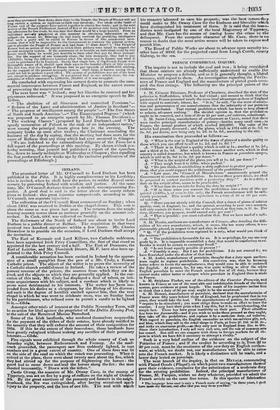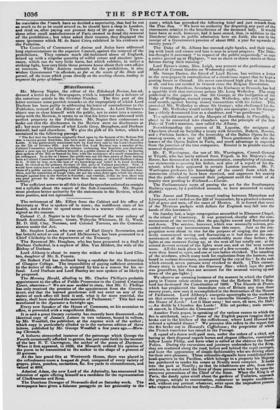FRENCH COMMERCIAL INQUIRY.
The inquiry is not to include the coal and iron ; it being consideied that these matters are already sufficiently understood to enable the Minister to propose a definite, and as it is generally thought, a libgral measure, with regard to them. An investigation regarding the Porn:- RIPS of France and England and the manufacture of plated goods occu- pied the first sittings. The following are the principal points of the evidence.
1. M. CMment Desornaes, Professor of Chemistry, described the state of the potteries in Staffordshire, which he had visited ; and seemed to think that the potteries of France possessed nearly the same local advantages as those of England with regard to materials, labour, &c. " It is," he said, " to the want of emula- tion and perseverance of our manufacturers that the inferiority of our potteries must be attributed. That eternal prohibition which has been so long allowed to subsist, advances nothing." His decided opinion is, that the prohibition ought to be removed, and a duty of 20 or 25 per cent., ad valorem, 6,11)4404d. 2. M. Saint-Cricq, manufacturer of earthenware at CREIL, stated that there were twelve principal manufactories of pottery—besides many small ones-,in France, the annual produce of which reached 200,000/. The value of 'the articles bad greatly decreased ; and the plates, which in 1814 sold at 3s. Gd. to es. 9d. per dozen, now bring only Is. 5d. to Is. fid., according to the size. '
His examination then proceeded as follows :-
Q. " What is the cost in England of the &wen of plates of a similar quality to those which you can afford to sell at Is. 5d. and Is. &L ?" A. " There is in England a quality which is sold at Is., another at Is. 5d., and a third at Is. 8d. After which, there conies another sort, which in that country is called ironstone, but which is known in France as porcelain opaque, i
which s sold at 2s. 9d. to 3s. 3d. per dozen."
Q. " What is the weight of the plates you sell at Is. 5d. per dozen ? " A. " They weigh nom 8 to bibs. wh;ii packed." Q. "Do you think, in establishing a duty sufficient to protect your produc- tions, that you could support the withdrawal of the prohibition?" A. "Last year, the Council of Manufactures' unanimously prayed the Government to continue the prohibition. In two or three years hence, we shall be prepared to content ourselves with a protecting duty! " As to a duty, a duty on the weight alone, scents to be practicable." i."What base do you take for fixing the duty by weight ?" A. " If in three years you convert the prohibition into a duty of Ms. per quintal (240I1is.), or even to 24s. only, the French manufacturer will be suffi- ciently protected. This would be equivalent to a duty of 20 or 30 per cent. ad valorem."
Q. "Have you not all eady told the Council, that a dozen of plates of inferior quality, cost, in England, Is., anti the quintal, according to your own account, will only contain 24 dozen ; the value of the quintal, at that rate, is 1/. 4s. The duty, therefore, you propose, would exceed cent, per cent?" A. "That is possible: you must calculate that. But we have need of a suffi- cient duty." 3. M. Hautin, earthenware-manufacturer at Cuoisv, after detailing the diffi- culties of his own manufactory, which, it seems, like too many others, is en- favourably placed, in respect to fuel and clay, is asked, " Q. "if the prohibition were replaced by a duty, what would you think of the measure ?"
A. "The prohibition is favourable for us. It is no privilege, for any one may profit by it. It is impossible to establish a duty that would be satisfactory tons. Besides it would be certain to encourage fraud." Q. "Is not fraud equally, possible at present ?" A. "Possibly it may. But I am for prohibition. I do not conceal it; we have flourished under the shadow of that tree."
4. M. Andre, manufactuler of porcelain, thought that a duty upon earthen- ware ought to replace prohibition. His conviction was, that by knowing better where to locate the manufacturers, they would soon be able to undersell the English. At present, he, for one, was quite willing to allow the white English porcelain to enter the French markets free of all duty, because they cannot make either better or cheaper white porcelain in Euglaud than is made in France.
5. M. Stephane Flaeket, one of the editors of the Courrier Francais, and known in France as one of the most able and indefatigable friends of the liberal system, gave evidence at great length. The result of his inquiries incline him to think that a duty of 30 per cent, ought to be the maxinium." 6. M. Honore, manufacturer of porcelain, declared that the manufactories of France were fifty years behind those of England, but be prophesied that in ten years, they would take the lead. The manufacturers of pottery, he continued, "require to be stimulated ; you must oblige them to make an effort to leave the routine. I may hurt their pride when I say this, but it is, notwithstanding, the simple fact. There has been great inactivity on their part. Their situation has been too favourable—and if you wish to make them _proceed as they ought, first take off the prohibition, and replace it by a moderate duty, ad valorem. With regard to porcelain, the English encumber us with tea-services gilt, red, and blue which they sell in the retail shops in Paris at from 2/. 184 to al. as.,
and make '
an enormous profit,—as they only cost in England from 25s. to 30s. Since their introduction, I only sell very rich sets, and the sale of common sets has ceased. But still we can compete with them in foreign markets for all ob- jects in which we have felt it necessary to attempt a rivalry." Such is a very brief outline of the evidence on the subject of the Potteries of France ; and if the verdict be according to it, from 20 to 30 per cent. must be the maximum of the new duty on English earthen- ware, at which, we doubt not, our manufactures will be able to come into the French market. It je likely a distinction will be made, and a lower duty levied on porcelain. The next branch of the inquiry, is that on METALS, commencing with Plated Goods (Placid), on Which point two manufacturers thereof gave their evidence, conelusive for the substitution of a moderate duty for the existing prohibition. Indeed, the principal manufacturer of France, M. Parquin, wishes no duty whatever, provided we admit the French article on the same free terms. In this species of fabrication • The langeage here used is only a French mode of saying, "in three years, I shall have aside my Centime, and after that you may do as you like." he maintains the French have so decided a superiority, that had he not as much to do as he could attend to, he should have a shop in London, and rival us, after paying our present duty of 20 per cent. Two or three other small manufacturers of Paris seemed to dread the removal of the prohibition ; but when asked their reasons, they displayed the same ignorance which M. de Saint Cricq exhibited in his evidence on the Potteries.
The Councils of Commerce of Amiens and Sedan have addressed long representations to the superior Council, against the removal of the prohibitions. They contain much old-fashioned abuse of England, mixed up with a singular quantity of wilful errors and absolute igno- rance, which can do very little harm, but which exhibits, in rather a striking light, how very little these persons know about their own affairs or interests. While Amiens contends for the 'prohibition, it also wishes Government "to alleviate, as far as the wants of the State will permit, all the taxes which press directly on the working classes, tending to augment the price of labour."



























 Previous page
Previous page